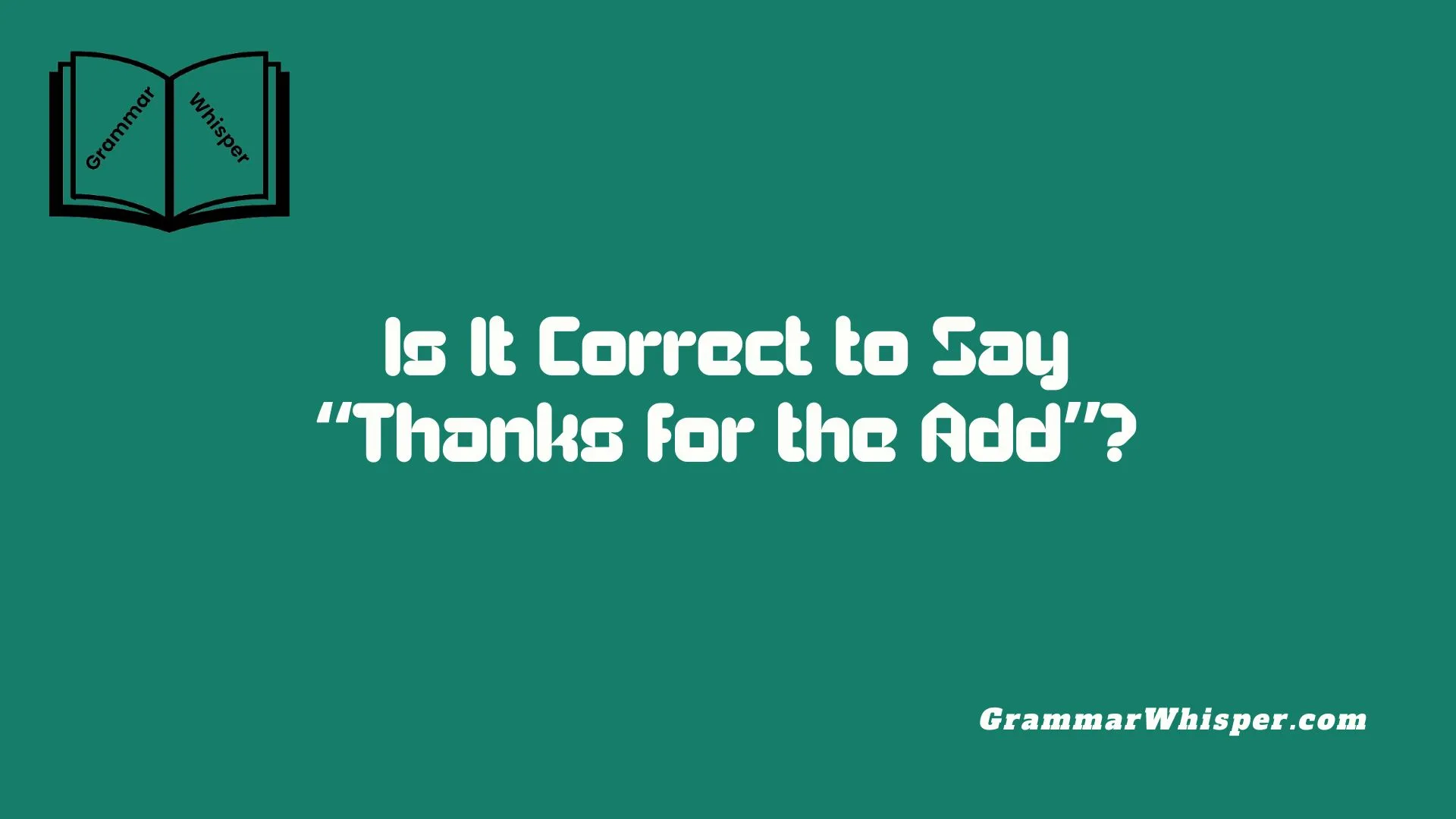In this hyper-connected world, the way we communicate has transformed fast. Whether it’s through messaging, apps, or social platforms, most of our daily interactions now happen with a screen between us. I’ve experienced this shift firsthand – we used to shake hands or greet each other face-to-face, but now it’s a quick message to a group, or maybe a simple follow. In these virtual spaces, many users choose to use short expressions like “Thanks for the Add” to acknowledge new connections. That phrase once felt natural, even polite, and was widely expected across various digital communities. But the context that made it feel sincere has started to change.
Nowadays, saying “Thanks for the add” often sparks debate. Some feel it’s just a friendly habit, others say it no longer feels correct or relevant to how people engage today. Grammar, formality, and tone all come into question, especially as language keeps evolving. Digital manners are adapting too, shaped by diverse cultures and the norms of different online spaces. With shifting expectations, even a simple thank-you carries cultural impact. What seems warm and welcoming in one group might feel stiff or even empty in another. That’s the reality of modern speaking – it’s fluid, fast, and always changing.
Understanding the Phrase “Thanks for the Add” in Online Interactions
“Thanks for the add” is a phrase used to express gratitude after someone accepts a friend request, follows, or adds another person on a digital platform. It became especially popular during the early 2000s, when platforms like MySpace, Facebook, and Orkut dominated.
Back then, adding someone was a deliberate gesture – more meaningful than today’s often passive “follow” system. Saying thanks helped set a friendly tone.
Today, it still appears on:
- Facebook friend requests
- LinkedIn connection approvals
- Group joins in Discord or forums
- Instagram follow-backs (less common)
Despite its simplicity, the phrase raises deeper questions about language, formality, and human behavior online.
Is “Add” Grammatically Correct as a Noun in This Phrase?
Let’s break it down.
The word “add” is technically a verb – short for “to add.” In “Thanks for the add,” however, it’s used as a noun, which raises eyebrows for language purists.
Traditionally, using a verb as a noun without proper grammatical conversion is frowned upon. That said, modern English has become extremely flexible, especially in digital spaces.
Examples of Verbs Turned Into Nouns in Everyday Speech:
| Verb | Informal Noun Form | Accepted Usage? |
| Invite | “Thanks for the invite” | Widely accepted |
| Add | “Thanks for the add” | Semi-accepted |
| Follow | “Thanks for the follow” | Accepted in social media |
| Like | “I got a like” | Fully integrated |
| DM | “Send me a DM” | Standard in digital slang |
Linguists call this conversion or functional shift, and it happens when a word changes grammatical role without altering form. So, while “add” as a noun isn’t found in formal grammar books, it is understood through context.
The Flexibility of Social Media Language
Language online doesn’t always follow the rules, and that’s okay. Digital communication is fast, informal, and often playful.
Social media users constantly:
- Create new words (e.g., “Finsta” for fake Instagram)
- Shorten phrases (e.g., “tbh,” “imo”)
- Modify grammar for speed and style
Using “add” as a noun is part of this trend. It isn’t wrong – it’s contextually correct within digital culture. It communicates the intended message without confusion.
“Online grammar is not incorrect – it’s evolving,” says Gretchen McCulloch, linguist and author of Because Internet.
So while your English teacher might cringe at “Thanks for the add,” most people know what it means – and that makes it valid.
Context Is Key: When “Thanks for the Add” Works and When It Doesn’t
You wouldn’t walk into a corporate meeting and say, “Yo, thanks for the add.” But you might say it in a casual Facebook message or on Discord.
When It’s Okay to Use:
- Facebook friend requests among old friends or acquaintances
- Reddit or Discord group approvals
- Gaming networks or subculture forums
- Casual professional communities (e.g., content creator groups)
When It Feels Outdated or Awkward:
- On professional platforms like LinkedIn
- In formal introductions or job networking scenarios
- When overused or copy-pasted into every new connection
- With Gen Z audiences, who prefer more natural or humorous language
In 2025, language is all about tone. What you say isn’t just about the words – it’s how and where you say them.
Better Alternatives to “Thanks for the Add”
Sometimes “Thanks for the add” feels robotic or impersonal. If you want to stand out or be more genuine, try something fresh.
Alternative Phrases (Grouped by Platform & Use Case):
| Phrase | Platform | Tone | Notes |
| Great to connect! | LinkedIn, email | Professional | Friendly and safe |
| Appreciate the connect | LinkedIn, Twitter | Semi-casual | Works well in tech/startup circles |
| Thanks for connecting with me | Facebook, LinkedIn | Neutral | Better than “add” in formal cases |
| Thanks for the follow! | Instagram, Twitter | Casual | Still widely used |
| Excited to be here! | Discord, Facebook groups | Friendly | Great for community engagement |
If you want to sound natural, customize your message. Mention something about the group, shared interest, or profile. Even one sentence of personalization makes a big difference.
Digital Gratitude Around the World: Cultural Norms
Digital etiquette is shaped by culture. In some regions, thanking someone for a connection is expected. In others, it may come across as excessive or even odd.
Examples:
- Philippines, India, Brazil: Gratitude phrases like “Thanks for the add” are still common and seen as polite.
- Western Europe & US: Increasingly seen as spammy or unnecessary – especially among younger users.
- Japan & South Korea: Prefer indirect acknowledgments and quieter forms of politeness.
Pro Tip: If you’re in international groups or networking globally, observe what others are doing before messaging.
The Psychology of Online Gratitude: Does It Matter?
You might ask: Does saying “Thanks for the add” actually help?
According to behavioral psychologists:
- Small acknowledgments of gratitude can trigger reciprocity
- However, generic or repetitive messages reduce engagement
- Personal messages (even short ones) are 10x more likely to receive replies
“In digital communication, authenticity always wins,” says Sherry Turkle, MIT sociologist and author of Reclaiming Conversation.
So yes – saying something matters. But how you say it matters more.
Why Some Users Dislike the Phrase “Thanks for the Add”
Not everyone appreciates the sentiment.
Common Complaints:
- Sounds like a copy-paste message
- Comes off as spammy or disingenuous
- Feels outdated – like using “LOL” in 2025
- Doesn’t add value or invite further conversation
Real Comments from Reddit & Twitter:
“I just connected with someone on LinkedIn and they sent ‘thanks for the add’… it felt like 2009 again.” – @NetiquetteNerd
“Unless we’re on MySpace, please stop saying that.” – r/socialskills
If your goal is to start a conversation, “Thanks for the add” usually isn’t the best opener.
From Formality to Casual: The Evolution of Online Etiquette
Let’s rewind to 2008:
- Facebook wall posts were common
- Friend requests felt meaningful
- “Thanks for the add” was a polite gesture
Now in 2025:
- Platforms use follows more than adds
- People receive hundreds of connection requests
- Conversations have shifted to DMs, emojis, and memes
The digital landscape has changed, and so have our social habits. Formality has given way to casual conversation, where tone and intent matter more than phrasing.
How to Respond to “Thanks for the Add” (Without Sounding Weird)
If someone messages you this, you don’t have to overthink it. A quick, kind reply works – or no reply at all, if it doesn’t require one.
Sample Replies:
- “Happy to connect with you too!” (neutral, friendly)
- “No problem – I like what you’re sharing.” (engaging)
- “Hey, nice to meet you!” (friendly and natural)
When Not to Respond:
- If it’s clearly a mass message
- If there’s no follow-up or intention behind it
- If it’s unsolicited or from a stranger with no shared interest
Use your judgment – and be respectful, always.
Quick Reference Table: Social Media Gratitude Phrases
| Phrase | Natural or Robotic? | Still Used? | Platform Suitability |
| Thanks for the add | Often robotic | Rarely | Facebook, forums only |
| Great to connect! | Natural | Common | LinkedIn, email |
| Thanks for the follow | Acceptable | Still active | Twitter, Instagram |
| Appreciate the connect | Slightly trendy | Growing | LinkedIn, Discord |
| Happy to be here | Welcoming | Always relevant | Groups & communities |
Final Thoughts
Grammatically? It’s a stretch – but acceptable in casual settings. Socially? It depends on your audience and platform. Practically? It’s often better to say something warmer, fresher, or more personal.
Online language is flexible – just like human interaction. What matters most is how it feels to the person reading it.
FAQs
Is it grammatically correct to say “Thanks for the add”?
Technically, “add” is a verb, not a noun. However, in informal online settings, its use as a noun is widely understood. Similar to phrases like “Thanks for the invite” or “Thanks for the follow,” this expression has become accepted in casual digital communication. It’s not grammatically formal, but it’s contextually correct.
Is “Thanks for the add” still used in 2025?
It’s still used, but far less than in the early days of Facebook and MySpace. On platforms like LinkedIn or professional networks, it’s considered outdated or even spammy. In casual forums or legacy platforms, you might still see it occasionally. More people now say “Great to connect” or “Appreciate the connect” instead.
What’s a better alternative to “Thanks for the add”?
More modern and human-sounding alternatives include:
- “Glad we connected.”
- “Appreciate the connection.”
- “Thanks for reaching out!”
- “Nice to meet you here.” These phrases work better across professional and casual platforms and sound less robotic.
Can saying “Thanks for the add” increase engagement?
Only if it’s personalized. Generic gratitude messages rarely lead to deeper conversations. If your message feels authentic and relevant, it might open the door to more interaction. Otherwise, it may be ignored – or worse, mistaken for spam.
Why do some people dislike the phrase “Thanks for the add”?
Many users find it impersonal, outdated, or unnecessary. It often feels like a copy-paste message without real intention behind it. In communities that value genuine conversation, using the phrase can feel shallow or disingenuous unless it’s followed by something meaningful.











